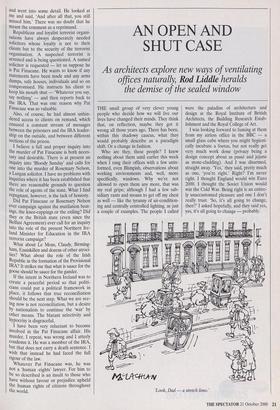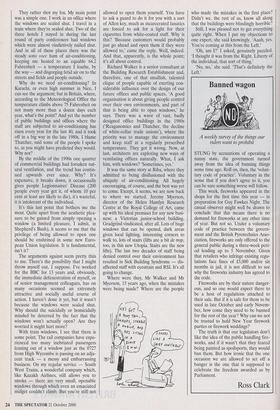AN OPEN AND SHUT CASE
As architects explore new ways of ventilating the demise of the sealed window
THE small group of very clever young people who decide how we will live our lives have changed their minds. They think that, on reflection, maybe they got it wrong all those years ago. There has been, within this shadowy caucus, what they would probably describe as a paradigm shift. Or a change in fashion.
Who are they, these people? I knew nothing about them until earlier this week when I rang their offices with a few unin- formed, even Blimpish, observations about working environments and, well, more specifically, windows. Why we're not allowed to open them any more, that was my real gripe; although I had a few sub- sidiary rants and moans to get off my chest as well — like the tyranny of air-condition- ing and centrally controlled lighting, as just a couple of examples. The people I called were the paladins of architecture and design at the Royal Institute of British Architects, the Building Research Estab- lishment and the Royal College of Art.
I was looking forward to fuming at them from my airless office in the BBC — a small glass cube where you might hygieni- cally incubate a foetus, but not really get very much work done (privacy being a design concept about as passe and jejune as stone-cladding). And I was disarmed, straight away. 'Yes,' they said, pretty much as one, 'you're right.' Right? I'm never right. I thought England would win Euro 2000. I thought the Soviet Union would win the Cold War. Being right is an entire- ly unaccustomed pleasure and one I don't really trust. `So, it's all going to change, then?' I asked hopefully, and they said yes, yes, it's all going to change — probably.
`Look Dad — a stretch limo.' They rather shot my fox. My main point was a simple one. I work in an office where the windows are sealed shut. I travel in a train where they're sealed shut. Two of the three hotels I stayed in during the last round of party conferences had windows which were almost vindictively nailed shut. And in all of these places there was the steady sotto voce hum of air-conditioning, keeping me heated to an equable 64.2 Fahrenheit — a temperature I loathe, by the way — and disgorging fetid air on to the streets and fields and people outside.
Why do we need air-conditioning? In Karachi, or even high summer in Nice, I can see the argument; but in Britain, where, according to the Meteorological Office the temperature climbs above 75 Fahrenheit on not many more than a dozen days each year, what's the point? And yet the number of public buildings and offices where the staff are subjected to air-conditioning has risen every year for the last 40, and it took off in a big way in the late 1980s. I blame Thatcher, said some of the people I spoke to, as you might have predicted they would. Why not?
By the middle of the 1990s one quarter of commercial buildings had forsaken nat- ural ventilation, and the trend has contin- ued upwards ever since. Why? It's expensive, it breaks down, it occasionally gives people Legionnaires' Disease (200 people every year get it, of whom 10 per cent at least are likely to die), it's wasteful, it is intolerant of the individual.
It's this last point that bothers me the most. Quite apart from the aesthetic plea- sure to be gained from simply opening a window (a limited pleasure, I admit, in Shepherd's Bush), it seems to me that the privilege of being allowed to open one should be enshrined in some new Euro- pean Union legislation. It is fundamental, isn't it?
The arguments against seem pretty thin to me. There's the possibility that I might throw myself out, I suppose. I've worked for the BBC for 13 years and, obviously, the immediate defenestration of myself, or of senior management colleagues, has on many occasions seemed an extremely attractive and socially useful course of action. I haven't done it yet, but it wasn't because the windows were sealed shut. Why should the suicidally or homicidally minded be deterred by the fact that the windows won't actually open? Are they worried it might hurt more?
With train windows, I see that there is some point. The rail companies have expe- rienced too many inebriated passengers leaning out of a window just as the 0727 from High Wycombe is passing on an adja- cent track — a messy and embarrassing business. On my regular service — South West Trains, a wonderful company which, like Kazakh Airlines, still allows you to smoke — there are very small, openable windows through which even an emaciated midget couldn't climb. But you're still not allowed to open them yourself. You have to ask a guard to do it for you with a sort of Allen key, much as incarcerated lunatics are forced to ask for a light for their cigarettes from white-coated staff. Why is this? 'Because customers would probably just go ahead and open them if they were allowed to,' came the reply. Well, indeed. And that, apparently, is the whole point; it's all about control.
Richard Walker is a senior consultant at the Building Research Establishment and, therefore, one of that smallish, talented clique of people capable of exerting con- siderable influence over the design of our future offices and public spaces. 'A good organisation is about giving people control over their own environments, and part of that is being able to open windows,' he says. There was a wave of vast, badly designed office buildings in the 1980s (`Reaganomics and Thatcher, the decline of white-collar trade unions'), where the priority was to manage the environment and keep staff at a regularly prescribed temperature. They got it wrong. Now, at last, architects are exploring new ways of ventilating offices naturally. What, I ask him, with windows? 'Sometimes, yes.'
It was the same story at Riba, where they admitted to being disillusioned with the ubiquity of air-conditioning. All hugely encouraging, of course, and the best was yet to come. Except, it seems, we are now back to where we started. Jeremy Myerson, director of the Helen Hamlyn Research Centre at the Royal College of Art, came up with his ideal premises for any new busi- ness: a Victorian junior-school building. Gradgrind vindicated, after all. Lots of huge windows that can be opened, dark areas given local lighting, interesting corners to walk to, lots of stairs (lifts are a bit de trap, too, in this new Utopia. Stairs are the new lifts). The last two decades of staff being denied control over their environment has resulted in Sick Building Syndrome — dis- affected staff with eyestrain and RSI. It's all going to change.
Where were they, Mr Walker and Mr Myerson, 15 years ago, when the mistakes were being made? Where are the people who made the mistakes in the first place? Didn't we, the rest of us, know all along that the buildings were blindingly horrible?
Still, I was pleased not to get everything quite right. When I put my objections to one expert, she said knowingly, `Aaah, yes. You're coming at this from the Left.'
`Oh, am I?' I asked, genuinely puzzled. `I thought it was from the Right. Liberty of the individual, that sort of thing.'
`No, no,' she said. 'That's definitely the Left.'


























































































 Previous page
Previous page